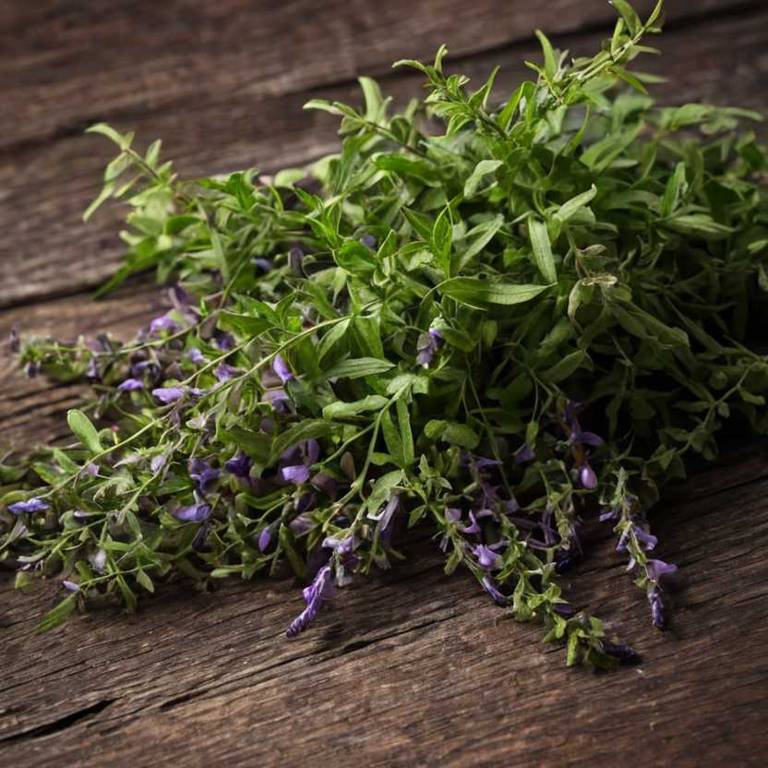By Leen Randell
Updated: Jul 05, 2024
What Are The Medicinal Properties Of Scutellaria Lateriflora (Skullcap)?

Scutellaria lateriflora, also known as skullcap, has health benefits such as reducing anxiety and insomnia due to its sedative and adaptogenic properties.
The herb contains medicinal constituents including flavonoids, phenolic acids, and sesquiterpenes, which are responsible for its therapeutic effects. Preparations of skullcap include teas, tinctures, and capsules, which are often used to treat anxiety and stress-related disorders. Side effects of skullcap may include dizziness, nausea, and interactions with other medications.
Precautions include pregnant or breastfeeding women, as well as individuals with certain medical conditions.
This article explains the health benefits, active constituents, medicinal preparations, possible side effects, and precautions related to Scutellaria lateriflora.
- What are the health benefits of Scutellaria lateriflora?
- What are the active constituents of Scutellaria lateriflora?
- What are the medicinal preparations of Scutellaria lateriflora?
- What are the possible side effect of using Scutellaria lateriflora improperly?
- What precautions to take when using Scutellaria lateriflora medicinally?
What are the health benefits of Scutellaria lateriflora?
Scutellaria lateriflora, also known as skullcap, has health benefits such as reducing anxiety and stress due to its adaptogenic properties.
It has been traditionally used to alleviate symptoms of insomnia and restlessness. Skullcap's flavonoids and triterpenoids also possess anti-inflammatory and antioxidant properties, making it a potential natural remedy for pain management and neuroprotection.
Some research suggests its effectiveness in treating conditions like ADHD and seizures.
Here's a detailed article about the 10 health benefits of Scutellaria lateriflora.
What are the active constituents of Scutellaria lateriflora?
Scutellaria lateriflora, also known as skullcap, has active constituents such as flavonoids, terpenoids, and phenolic acids.
The most significant flavonoid present is baicalin, which is responsible for its anti-inflammatory and antioxidant properties. The plant's terpenoid profile includes sesquiterpenes like wogonin, which has shown neuroprotective effects.
Additionally, the plant contains apigenin and quercetin, flavonoids with anti-inflammatory and immune-modulating activities, contributing to skullcap's medicinal value.
Here's a detailed article about the 10 active constituents of Scutellaria lateriflora.
What are the medicinal preparations of Scutellaria lateriflora?
Scutellaria lateriflora, also known as skullcap, has medicinal preparations such as teas, infusions, and tinctures that are used to alleviate anxiety, insomnia, and stress.
The plant's aerial parts are often dried and made into capsules or tablets, providing a concentrated form of the herb's active compounds.
Additionally, skullcap is sometimes combined with other herbs in traditional remedies to enhance its relaxing and sedative properties.
Here's a detailed article about the 10 medicinal preparations of Scutellaria lateriflora.
What are the possible side effect of using Scutellaria lateriflora improperly?
Improper use of Scutellaria lateriflora, also known as skullcap, increases the chances of experiencing side effects such as dizziness, headaches, and gastrointestinal issues.
In rare cases, high doses may cause seizures or interact with medications, particularly blood thinners and sedatives.
Individuals with allergies or certain medical conditions, such as epilepsy, should consult a healthcare professional before using skullcap to minimize potential risks.
Here's a detailed article about the 10 most common side effects of Scutellaria lateriflora.
What precautions to take when using Scutellaria lateriflora medicinally?
Before using Scutellaria lateriflora, also known as skullcap, for medicinal purposes, you must take precautions such as consulting with a healthcare professional, especially if you are pregnant or breastfeeding.
High-quality products are essential, and look for organic and sustainably sourced options to minimize risks.
Monitor your body's response and adjust dosages accordingly, as skullcap can interact with certain medications and exacerbate underlying health conditions.
Here's a detailed article about 10 precautions to take when using Scutellaria lateriflora.